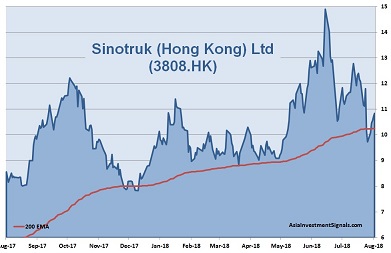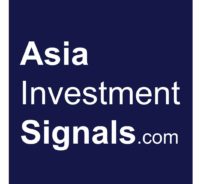 Sinotruk (Hong Kong) Ltd (3808.HK) is one of the leading truck manufacturer in China and among Forbes’ Global 2000 companies. Sinotruk produces heavy and light duty trucks as well as buses, related key parts and components such as engines, cabins, axles, steel frames, gearboxes.[mepr-active membership=”1734″ ifallowed=”show” unauth=”message” unauth_message=”Please login or purchase a membership to view full text.”] The company sold over 260,000 trucks in 2017 with heavy-duty trucks contributing to around 82 percent to the company’s revenues. The segment increased by around 80 percent over the last year. China’s heavy truck industry experienced substantial growth since 2016 primarily driven by the implementation of national standards for new vehicles and stricter emission standards.
Sinotruk (Hong Kong) Ltd (3808.HK) is one of the leading truck manufacturer in China and among Forbes’ Global 2000 companies. Sinotruk produces heavy and light duty trucks as well as buses, related key parts and components such as engines, cabins, axles, steel frames, gearboxes.[mepr-active membership=”1734″ ifallowed=”show” unauth=”message” unauth_message=”Please login or purchase a membership to view full text.”] The company sold over 260,000 trucks in 2017 with heavy-duty trucks contributing to around 82 percent to the company’s revenues. The segment increased by around 80 percent over the last year. China’s heavy truck industry experienced substantial growth since 2016 primarily driven by the implementation of national standards for new vehicles and stricter emission standards.
But also Sinotruk’s finance and engine segments grew significantly at rates of 134 and 81 percent respectively over the last year. The company benefited strongly from the collaboration with Germany’s truck and engine manufacturer MAN. 87 percent of Sinotruk’s revenues come from domestic sales. However, exports grew by 21 percent last year with strong sales from less developed markets such as Africa and Southeast Asia.
China’s heavy truck industry offers currently many opportunities. Large-scale infrastructure projects will continue to push up demand for construction vehicles. More and more provinces and cities are upgrading to higher emission standards and conduct controls on unqualified vehicles to encourage their phasing-out. Stricter controls of oversized and overloaded trucks will further promote the replacements of vehicles. Restrictions on traditional energy cars will lead to increased demand for clean and new energy vehicles. Finally, urbanization will promote demand for special purpose vehicles such as cold chain trucks, hazardous chemical trucks, sanitation trucks, and fire trucks.
Sinotruk was founded in 2004 and is headquartered in Jinan, China. The shares are listed on the main board of Hong Kong’s stock exchange since 2007 and can also be traded in Germany and the US. Major shareholder is the state-owned China National Heavy Duty Truck Group Company, the third largest heavy truck manufacturer in China, with an ownership of 51 percent, followed by the German Volkswagen Group, the world’s leading automobile manufacturer, with an ownership of 25 percent. 24 percent of the shares are in public hand.
With a workforce of over 24,800 employees, Sinotruk reported revenues of 55.5bn RMB (8.1bn USD) and profits before tax of 4.05bn RMB (594m USD) in its fiscal year 2017. This is an increase of 68 and 340 percent respectively compared to the same period a year ago. In 2016, revenues and profits increased by 16 and 116 percent respectively. The operating margin of 8 percent is behind the industry average but has room for improvements. Sinotruk’s cash reserves increased by 37 percent to 9.8bn RMB (1.4bn USD) at the end of 2017. The company shows a healthy balance sheet with good profitability and financial strength. The equity ratio is at 42 percent and the gearing, defined here as total liabilities to total equity, at acceptable 141 percent. Next results will be announced at the end of August.
Sinotruk’s shares are in an uptrend since January 2016 and gained around 350 percent in value since, more than 20 percent this year alone. The company is priced at nine times earnings. The shares trade slightly above book value and at five times operating cash flow. The latest dividend yielded more than 6 percent. 7 out of 10 analysts have ‘outperformer’ or ‘buy’ recommendations on the stock.
Our conclusion: The company shows a healthy balance sheet with good profitability and financial strength. The valuation is reasonable. The global industry outlook is positive with expected annual growth rates of four percent until 2024. Due to the partnership with the German MAN, the company is well positioned in an intensely competitive environment. Revenues and profits grew by 9 and 15 percent respectively over the last five years. Assuming a stable global economic growth, we expect the share price to increase another 10 to 15 percent over the next six months.
AIS Rating: ★★★★☆
| 2012 | 2013 | 2014 | 2015 | 2016 | 2017 | |
|---|---|---|---|---|---|---|
| EPS (RMB) | 0.04 | 0.1 | 0.15 | 0.07 | 0.19 | 1.09 |
| Change | -89% | 150% | 50% | -53% | 171% | 474% |
| P/E | P/E SECTOR |
P/B | P/CF | Equity Ratio* |
ROE | LIAB./ Equity** |
Div YLD |
|---|---|---|---|---|---|---|---|
| 9 | 22 | 1.1 | 5 | 42% | 14% | 141% | 6.5% |
* Equity / Total Assets, ** Total Liabilities / Equity
[/mepr-active]
